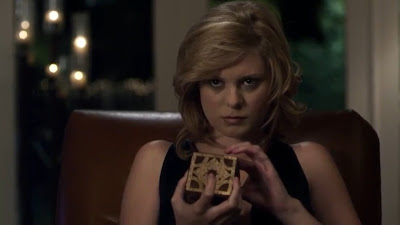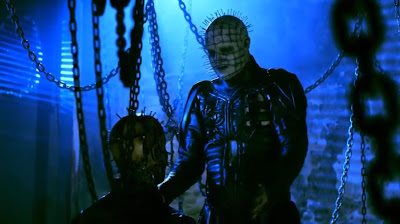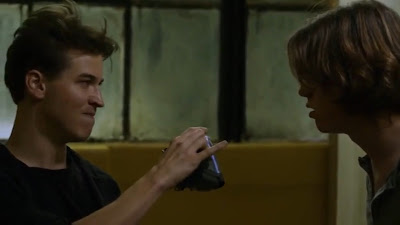 |
| Emma Craven (Tracey Fairaway) finds a puzzle box among her missing brother's possessions. Tedium ensues. |
Release Date: Mar. 18, 2011. Running Time: 75 minutes. Screenplay by: Gary J. Tunnicliffe. Directed by: Victor Garcia. Produced by: Aaron Ockman, Joel Soisson.
THE PLOT:
Nico (Jay Gillespie) and Steven (Nick Eversman) take an impromptu trip to Mexico, with Nico enthusing that this trip will allow his friend to finally lose his virginity. Their little vacation quickly goes awry. A series of events that seem like the plot of a rejected Hangover knockoff culminate in Nico opening the Lament Configuration and summoning the Cenobites, while Steven looks on in horror.
A year later, their families gather together to eat and drink and... not much else, really. Emma (Tracey Fairaway), Steven's sister and Nico's girlfriend, is upset at everyone's refusal to talk about the missing boys. She sneaks into Steven's room and finds among his things a tape the boys had made of their misadventures and the puzzle box. She begins playing with the box, partially opening it.
She's interrupted by an unexpected visitor: Steven! He has returned, weak and disoriented, raving about he escaped from "them" and how Nico didn't want to come back. His father wants to take him to the hospital. But when he checks the driveway, both cars are gone, and the phone is out of service.
They decide to wait for morning, putting Steven to bed to recover. But the long night has only just begun, and not everyone in the house will survive to see the morning...
 |
| Ross (Steven Brand) tries to get answers from a disoriented Steven (Nick Eversman). |
CHARACTERS:
Ross: Steven and Emma's father, a psychologist of some sort, though that never plays into the story. He's presented as someone upright and responsible, and he takes charge once the characters find themselves cut off from the world. He's not a particularly interesting character, with even the secret he's hiding being pretty mundane. Still, actor Steven Brand at least has a hint of screen presence, which is more than can be said for the rest of the cast.
Steven/Nico: Of the two missing friends, Nick Eversman's Steven is very much the "beta," following Nico's lead in all things, even when he knows that he shouldn't. Jay Gillespie's Nico swaggers around like someone who believes himself the king of all he surveys. Flashbacks show that Nico not only led both of them into trouble, but that he was a monster long before the Cenobites ever showed up.
Emma: Steven's sister and Nico's girlfriend, which makes her the most direct connection between the two families. And that, and being upset about the boys' disappearance, is about it for her character. We're told that she harbors a "darkness," but we never really see it. Well, unless you count her flirting with Nico's father (Sebastien Roberts), another element that never goes anywhere. Actress Tracey Fairaway is pretty... which is about all I can say, as there is little opportunity for her to act either well or badly.
 |
| This movie's lead Cenobite. I refuse to call him "Pinhead." |
STEPHAN SMITH COLLINS AND FRED TATASCIORE AS NEEDLE-FACE:
Doug Bradley turned down Revelations, citing a script that he felt was "unfinished" and a payment offer that was inadequate. As a result, this movie's version of the lead Cenobite is portrayed by two actors: the physical form of Stephan Smith Collins and the voice of Fred Tatasciore.
Tatasciore is generally a very good voice actor, and I specifically praised his performance as the villainous Saren in my review of Bioware's Mass Effect. But here, he just sneers his lines in a generic villain voice, while Stephan Smith Collins unsuccessfully attempts to project a menacing presence. Google "Pinhead cosplay," and you'll find far more convincing and threatening Pinheads than this.
I'll be fair: It's not like the filmmakers could help Doug Bradley turning them down. They could, however, have given his replacement a chance by keeping his characterization consistent with other entries. Nope. At one point, he tells the boorish Nico that he has "a darkness that rivals my own." Pinhead's human form was in the trenches at World War I; he'd have found the likes of Nico tediously ordinary long before he came into possession of the puzzle box. This guy doesn't even deserve to be called Pinhead, which is why I've decided to refer to him only as "Needle-Face."
Pinhead was a "Hell Priest" who believed in order and abided by a certain set of rules. By contrast, Needle-Face is a generic slasher. Even when Bloodline threatened to reduce Pinhead to that state, he retained a certain reflective eloquence. Needle-Face just growls, "Fool," at his human victims, like he's been possessed by the spirit of Mr. T. One scene sees him straight-up murdering a victim who neither opened the box nor desired anything. Why? Because that person directly provided him with relevant information. He claims another victim, one who also had nothing to do with opening the box. This is done to punish another character, one who - you guessed it - also had nothing to do with opening the box.
Back in Hellbound, when the evil Dr. Channard made Tiffany open the Lament Configuration, the real Pinhead refused to claim her. "It is not hands that call us. It is desire!" Based on this movie, Needle-Face would not only have pounced on Tiffany - He'd have also told his minions to massacre everyone in a 5-mile radius.
But then, at his best, Pinhead was an interesting character. Needle-Face is just a bad costume.
 |
| The families on the anniversary of their sons' disappearance. In retrospect, I think they were celebrating. |
THOUGHTS:
"If they claim it's from the mind of Clive Barker, it's a lie. It's not even from my butt-hole."
-Hellraiser creator Clive Barker's response to the release of Hellraiser: Revelations.
Doug Bradley would later refer to Hellraiser: Revelations as an "ashcan movie," and that's fairly accurate. This was not made to actually do anything with the Hellraiser franchise. Revelations was cranked out, script to (sole) theater screening, in a matter of weeks so that Dimension films could retain the franchise rights. Wikipedia lists its estimated budget at $300,000. If you told me the actual amount was a tenth of that, I would absolutely believe you.
You can make a good movie with very little money. Genuinely fine films have been made on lower budgets than Hellraiser: Revelations. But if you have no money, then you need time to get the script right. On the reverse end, studios can still sometimes make watchable movies with no time by throwing money at them.
Take away both resources, and... well... (shrugs)
From its opening moments, Revelations resembles nothing so much as a bad fan film. It's cheap, with most of the story unfolding in just a couple of sets. The story has one halfway clever element... one that's a direct lift from the original 1987 Hellraiser. And yes, the presence of Needle-Face destroys any semblance of a professional product every time he lurches onto the screen.
 |
| Nico bullies Steven. With competent writing, their toxic friendship might have been interesting. |
GLIMMERS OF UNREALIZED POTENTIAL:
There are ideas that could have worked, had the script gone through multiple drafts and had it been given to a director not best known for such works as Return to House on Haunted Hill. The story moves back and forth between the present-day timeline and flashbacks of Nico and Steven's ill-fated Mexico trip. As presented, this is annoying, mainly because Nico and Steven are instantly unbearable. But had the script pared back on their jerkiness and made them seem like average kids, only gradually revealing that Nico is a sociopath who has made Steven emotionally dependent on him, it might have been interesting.
The present-day plotline could also have worked. The idea of structuring a low budget Hellraiser as essentially a stage play, with character relationships and secrets gradually unveiled, has potential... but only if the characters have layers worth peeling back. Emma flirts with Nico's father, who is entirely responsive to that. Instead of following up on this, it ends up being a single interaction that no one ever even comments on. A secret is revealed at the very end. Fine, except there is absolutely nothing that builds to it and practically nothing proceeds from it, making it just a bit of soap opera theatrics. I've already mentioned that Emma is two-dimensional eye candy. Well, she's an Ibsen heroine compared to the two wives, who say little and do nothing.
So yes, there were a couple of ideas with a hint of potential. Hellraiser: Funny Games? I wouldn't mind seeing a decent take on that. But as it stands, most of the film just has us waiting around for the Cenobites to show up and put these characters out of our misery.
OVERALL:
Gore effects are decent, which I think shows where the production's priorities lay. That aside, this movie fully lives down to its terrible reputation. It isn't even comically bad, save for a few chuckles and facepalms courtesy of Needle-Face. The bulk of this can be summed up with the most damning descriptor I can think of for any movie:
It's boring.
Overall Rating: 1/10. Can we have Rick Bota back?
Previous Movie: Hellraiser - Hellworld
Next Movie: Hellraiser - Judgment
Review Index
To receive new review updates, follow me:
On Twitter:
On Threads:
No comments:
Post a Comment